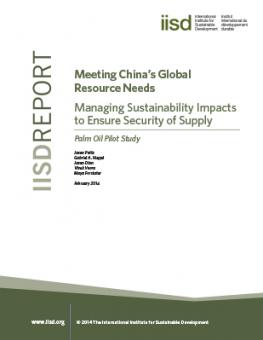
Meeting China's Global Resource Needs Managing Sustainability Impacts to Ensure Security of Supply: Palm Oil Pilot Study
China’s large and growing inbound supply chains are among the most direct ways in which China’s rise impacts economies worldwide.
For exporting countries this trade brings economic benefits such as employment, income and investment, but can also be associated with social and environmental (or “sustainability”) problems. Negative impacts on land, water, air, biodiversity and communities can translate back into supply chain problems for China, whether through short-term disruptions or the broader impact on China’s “brand” in international markets, which can affect the ability of Chinese enterprises to access international capital, resources, markets and talent.
China’s strategic concerns to address resource scarcity and build an “ecological civilization” make effective management of the social and environmental footprint of inbound supply chains increasingly critical. Sustainability risks therefore should count for enterprises and policy-makers concerned with China’s inbound supply chains. Yet for most companies operating in China, sustainability risks in inbound supply chains are poorly understood and often inadequately managed.
This initiative of the International Institute for Sustainable Development, supported by the U.K. Government’s Department for International Development (DFID), is intended to help overcome this gap. The project:
- Developed and tested a methodology for assessing the relationship between sustainability and security of supply risks in inbound supply chains.
- Undertook two pilots to test the methodology, based on desk research, looking at the copper and palm oil supply chains.
- Surveyed and convened discussions with business people, policy-makers, academics, and non-governmental organizations to test the concepts, methodology and findings, and to identify policy-relevant conclusions.
This paper, which outlines the findings of the palm oil pilot, is therefore complemented by a paper on the copper pilot, and a technical paper on the methodology. These three input papers feed into the overall synthesis paper, which integrates the overall findings and draws out conclusions and policy recommendations.
Participating experts
Additional downloads
You might also be interested in
Agreement on Climate Change, Trade and Sustainability: A landmark pact for trade and sustainability
The ACCTS pact, signed by Costa Rica, Iceland, New Zealand, and Switzerland, aligns trade and environmental policies, tackling fossil fuel subsidies, eco-labels, and green trade.
Can China Contribute to Climate Action in Latin America?
Sisi Tang discusses three climate action initiatives between China and Latin America: a crediting mechanism for clean energy, debt-for-climate swaps, and a greener free trade agreement.
Addressing Carbon Leakage: A toolkit
As countries adopt ambitious climate policies, this toolkit examines strategies to prevent carbon leakage—when production and emissions shift to nations with weaker climate policies—and explores the trade-offs of each approach.
IISD Trade and Sustainability Review, December 2024
This edition of the IISD Trade and Sustainability Review presents four expert perspectives on how agricultural support and subsidies can promote sustainability in developing and least developed countries.